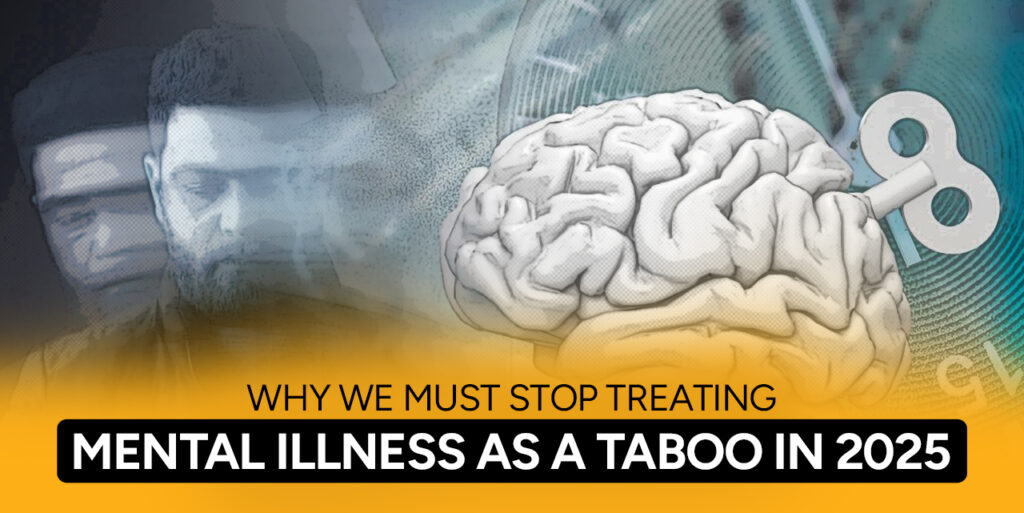For far too long, mental illness has been surrounded by silence, stigma, and stereotypes. While the world has made incredible progress in technology, healthcare, and social awareness, one area still lags behind: how we talk about mental health. In 2025, it’s time to stop treating mental illness as a taboo subject and start recognizing it as a normal part of human health—just like physical illnesses.
Why Mental Illness Is Still a Taboo
The main reason mental illness remains a taboo is the misconceptions of mental illness that circulate in society. Many people assume that mental health struggles are signs of weakness, or worse, character flaws. Others believe that someone with depression or anxiety can simply “snap out of it” with willpower. These misconceptions about mental illness are harmful because they prevent people from seeking help and fuel judgment against those who do.
Some of the most common misconceptions related to mental illness include:
- Thinking mental illnesses are rare (when in fact millions of people worldwide live with them).
- Believing therapy or counseling is only for “serious cases.”
- Assuming medication makes people dependent or changes their personality.
Each misconception about mental illness builds a barrier that keeps people from reaching out, sharing their struggles, and accessing treatment.
Common Misconceptions About Mental Illness

Here are some everyday misconceptions related to mental illness that need to be challenged:
“People with depression are just lazy.”
In reality, depression is a serious medical condition that affects energy levels, motivation, and even brain chemistry. It’s not about laziness; it’s about struggling with symptoms beyond one’s control.
“Mental illness only happens to weak people.”
Anyone, regardless of age, gender, or background, can face mental health issues. Even successful leaders, athletes, and celebrities openly talk about their mental health struggles. Strength comes from asking for help, not ignoring it.
“Therapy is only for crazy people.”
This misconception about mental illness is one of the most damaging. Therapy is not just for crises; it’s also for stress management, relationship issues, or personal growth.
“Children can’t have mental illnesses.”
Kids and teenagers also experience anxiety, depression, and other conditions. Ignoring this fact delays treatment and makes struggles worse as they grow.
“Is sleepwalking a sign of mental illness?”
Many believe sleepwalking means someone has a mental disorder. In truth, sleepwalking is usually linked to sleep disturbances and not directly to mental illness. This confusion shows how myths spread when we don’t talk about mental health openly.
Each misconception about mental illnesses builds a barrier that keeps people from reaching out, sharing their struggles, and accessing treatment.
Breaking the Silence: Why Talking Matters
Mental health issues thrive in silence. When people don’t feel safe talking about their feelings, they bottle up emotions until they reach a breaking point. Talking openly helps break stereotypes and normalize the idea that needing help is nothing to be ashamed of.
For instance, have you ever wondered, “Is sleepwalking a sign of mental illness?” This is a question many people ask, showing how curiosity often arises from confusion. While sleepwalking is usually linked to sleep disorders rather than mental illness, the fact that people associate it with mental health shows how easily myths can spread. Having open conversations ensures people get correct information instead of relying on assumptions.
Prevention of Mental Illness: Starting Early
One of the most effective ways to reduce the burden of mental illness is through prevention. The prevention of mental illness starts with building healthy lifestyles, teaching emotional resilience, and providing mental health education from a young age. Just as schools teach children about physical health and exercise, they should also teach coping skills, mindfulness, and stress management.
Simple steps like:
- Encouraging good sleep habits,
- Practicing stress-reducing activities (such as journaling or meditation),
- Promoting strong support systems, all contribute to the prevention of mental illness.
When we prioritize early intervention and awareness, we reduce the chances of small issues turning into long-term struggles.
The Role of Society in 2025
Society has the power to shape how we view mental health. Social media, workplaces, schools, and even families can either contribute to stigma or help dismantle it. In 2025, we need to:
- Educate: Spread awareness to replace misconceptions about mental illness with facts.
- Support: Encourage people to share their stories without fear of judgment.
- Provide Access: Ensure mental health services are affordable and available to everyone.
When communities take these steps, they create a culture where asking for help is normal, not shameful.
Misconceptions About Mental Illness in Everyday Life

You might be surprised how often myths creep into everyday conversations. For example, labeling someone as “crazy” just because they’re stressed, or assuming people with bipolar disorder are dangerous. These are rooted in misconceptions of mental illness that we’ve carried for decades.
In Reality:
- Most people with mental illnesses live normal, functional lives.
- Therapy and medication are tools for recovery, not signs of failure.
- Mental illness doesn’t define who you are—it’s just one part of your overall health.
Why 2025 Must Be Different
The past few years have shown us the importance of mental health. The pandemic, economic pressures, and global challenges have all taken a toll on people’s minds. If there’s one lesson we should carry into 2025, it’s that mental health cannot be ignored or stigmatized.
Treating mental illness as a taboo only isolates people further. When we openly talk about it, promote awareness, and fight the misconceptions related to mental illness, we make it easier for people to seek help. And when people get help, society as a whole becomes healthier, more compassionate, and more resilient.
Final Thoughts
Mental illness is not a personal weakness, nor is it something to be ashamed of. It’s a part of the human experience, and just like physical health, it requires care and attention. By addressing the misconceptions of mental illness, promoting the prevention of mental illness, and encouraging open dialogue, we can finally break the cycle of silence.
So, the next time someone asks, “Is sleepwalking a sign of mental illness?” use it as an opportunity to educate, share, and start conversations that matter. Because in 2025 and beyond, the goal is clear: mental illness should never be a taboo again.
Discover the various mental illnesses, their symptoms, signs, and side effects, and learn how to support those affected, all in “Decode”, the documentary on mental health by RAVA Documentary Films, exclusively on YouTube.

